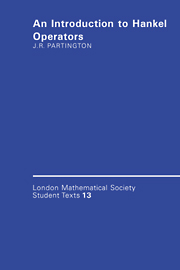6 - Hankel-norm Approximation
Published online by Cambridge University Press: 25 January 2010
Summary
The main aim of this chapter is to present the celebrated results of Adamjan, Arov and Krein, which give the achievable error in approximating a Hankel operator Γ by another one of smaller rank. For this we begin by reformulating Kronecker's theorem from Chapter 4 in terms of Blaschke products.
The next step in the argument requires us to consider the kernel (null space) of a Hankel operator: here we give the elegant theorem of Beurling on closed shift-invariant subspaces of H2 (which itself requires no operator theory at all).
With Beurling's theorem established we proceed to examine the Schmidt pairs of Γ in detail. An inner function b appears naturally at this stage of the argument and to complete the proof we consider the subspace bH2 in order to show that b is a Blaschke product with the required properties.
The proof is not an easy one and so we clarify some of the details with an illustrative example – for simplicity we are content to approximate a rank two Hankel operator by one of rank one.
In one sense, the main A-A-K result is a natural generalization of Nehari's theorem; as there, it turns out that, once one knows that there is an optimal rank-n approximant, then it is relatively straightforward to work out what it must be. We perform this calculation and hence establish uniqueness.
We follow Power's simplified approach to the Adamjan-Arov-Krein results in this chapter, expanding upon some of the more tricky details.
- Type
- Chapter
- Information
- An Introduction to Hankel Operators , pp. 55 - 65Publisher: Cambridge University PressPrint publication year: 1989



